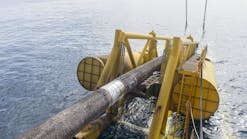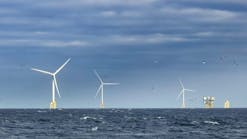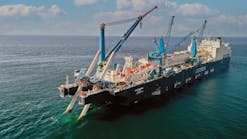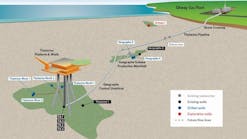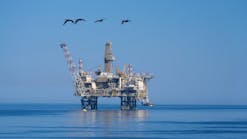A combination of low oil prices and government confusion served to encourage operator apathy to Equatorial Guinea's first deepwater bidding round. Thirty blocks were on offer in the round, which ended on May 10. Several companies were discouraged by the fact that Elf and Mobil were favored by the government to win some of the blocks.
Elf was granted a block adjacent to Nigeria's leases, just when the bid round kicked off, while Mobil was offered the right of first option on some leases. Sources say that companies like Texaco, Exxon, and Chevron regarded such acts by the Equatorial Guinea Government as unfair and decided to stay out of the bidding.
"But there was also the issue of low prices," one company official said. "Whereas the Angola bid rounds were keenly contested, even in an era of low prices, because of the prospectivity of the blocks, such a case could not be made for Equatorial Guinea." The biggest find in Equatorial Guinea is Zafiro (300 million bbl recoverable) and then it is in 150 meters of water for the most part.
The Government announced plans to extend the May 10 deadline for the bidding round "in order to give more companies the opportunity to evaluate the data and participate," according to a source in Malabo, the capital of the small island country. But no one responded and the issue was quietly dropped.
Some of the deep offshore Equatorial Guinea has analogous geological framework as the deepwater segment of the southeast offshore of Nigeria, which has proved to hold oil by the Elf discovery Ukot-1 (600 million bbl of oil). Water depths range between 200 meters and 2,000 meters. The main data so far is the processed product of the seismic survey carried out last year by Western Geophysical. Besides, the British company Exploration Consultants, which advises the EG government on the bidding exercise, is offering geological data. Equatorial Guinea joined the league of oil producing nations in December 1996 when Mobil turned the tap on Zafiro, now producing 80,000 b/d of oil.
Four African governments sign MOU on pipeline
Governments of four West African countries have finally signed a Memorandum of Understanding (MOU) in connection with the $400 million proposed West African Gas Pipeline (WAGP). The document, signed in Cotonou, the commercial capital of the Benin Republic, puts to rest speculations about the reluctance of the four governments to put political weight behind the project. Such misgivings have been heightened by the announcement by Côte d'Ivoire of plans to supply gas to Ghana. Such supply, even if meant to be in the short term, has been seen as possibly reducing the claim for a long-term project such as the WAGP.
The project is meant to deliver Nigerian natural gas to Benin Republic, Togo, and Ghana. The signing of the MOU, on August 11, was immediately followed by the Joint Venture Agreement (JVA) among a consortium of six companies from the four participating countries. The companies include Chevron Nigeria Limited, Nigerian Gas Company Limited, Shell Petroleum Development Company of Nigeria Limited, Ghana National Petroleum Corporation, Society Beninoise De Gaz, and SoToGaz of Togo. The MOU follows up on the Heads of Government Agreement (HOGA) endorsed in Lagos in September, 1995, to set out the framework for the project.
The HOGA established a steering committee to ensure the speedy and coordinated implementation of the project. A fallout of this was the preparation of a detailed feasibility study to determine the technical and commercial viability of the project. The study suggested the 620-mile (990 km) pipeline would take 24 months to build and start at 100,000-150,000 MMcf/d capacity rising to 600,000 MMcf/d over 20 years. For Nigeria, Africa's biggest oil exporter, it marks another step towards its stated goal of eliminating gas flaring associated with oil production of more than 1.9 million b/d of crude. About 70% of Nigeria's gas is currently burned off.
Nigerian legislators dismiss Niger Delta commission bill
Nigerian senators, elected in the new democracy ushered in last May, have disparaged the draft of the legislation to govern operations and compensations in the Niger Delta Basin. "The Niger Delta Commission Bill, in its current form, will be part of the problem, rather than the solution to the Niger Delta Crisis" according to Udoma Udo Udoma, a senator from one of the oil producing communities in the Niger Delta Basin.
The bill, submitted in July by President Olusegun Obasanjo, calls for a commission on which governors of nine oil producing states will serve and which will have a budget aimed at developing infrastructure in the region. Community disturbances are the most serious problem facing oilfield activity in Nigeria's Niger Delta Basin. Oil workers, especially expatriates working for multinationals, are routinely captured and held hostage by idle youths in villages where oil production activity are taking place. The youths demand hefty compensation from the oil companies to release the hostages. They argue that 43 years of oil production have polluted their environment and left their communities more impoverished. Hostage taking and oil platform hijacking have become so regular they are showing up on the bottom line. The cost of finding and producing a bbl of oil in Nigeria, which used to be one of the lowest in the world, has increased, in part as a result of increased expenses by oil companies to provide infrastructure.
The Senators suggest that Nigeria's Federal Government should pay 13% of the Federation account to the oil producing states as well hand over a percentage of the Petroleum Profits Tax. "Its their money," says Udo Udoma, himself an oil lawyer. "Let them do whatever they want to do with it."
Jim Cunningham moves to Cravo-1
Almost as soon as it suspended Orquidea-1, the rig Jim Cunningham commenced drilling Cravo-1, a new structure in the prolific Block 17, for the French multinational Elf in deepwater offshore Angola. The water depth is 4,455 ft and the proposed total depth is 10,170 ft, leaving 5,175 ft of sediments between the sea bottom and total depth of the well. Elf is likely to be targeting the predictably oil-filled Miocene reservoirs, but it's not clear whether the structure is related to any of the spectacular discoveries Elf has made in that area.
So far, Elf expects to retrieve more than 3 billion bbl from its Block 17 fields, including Girassol, Dalia, Rosa, Lirio, and their satellites. In the last three months Elf has suspended two good wells: Tulipa-1 and Orquidea-1. The latter tested 1,700 b/d of oil in one of the reservoirs. The first field in Block 17, Girassol, will go into production in 2002.
Digital/Veritas, PGS expand deepwater spec survey in Nigeria
The imminent bidding round, coupled with the new government's drive for increased oil production has again heightened the profile of Nigeria's deepwater leases. Two geophysical companies, who have acquired non-exclusive speculative surveys in the area have announced new programs aimed at increasing the volume of the spec data. The joint venture between Digital Nigeria and Veritas is planning to acquire 4,000 sq km of 3D data in the ultra-deepwater OPLs 322, 324, and 326.
The joint venture will also acquire an additional 4,500 line km 2D data as infill into the existing 10,000 km 2D data in OPLs 317, 318, 319, 320, 321, 322, 323, 324, 325, 326, 327, and 328. The other company, PGS, has announced it has been given approval rights by the Department of Petroleum Resources to acquire an additional 4,000 sq km of 3D seismic data in the outer ultra-deep offshore area for the Phase II of the project. It will be utilizing the streamer Ramford Viking S/V for the survey.
